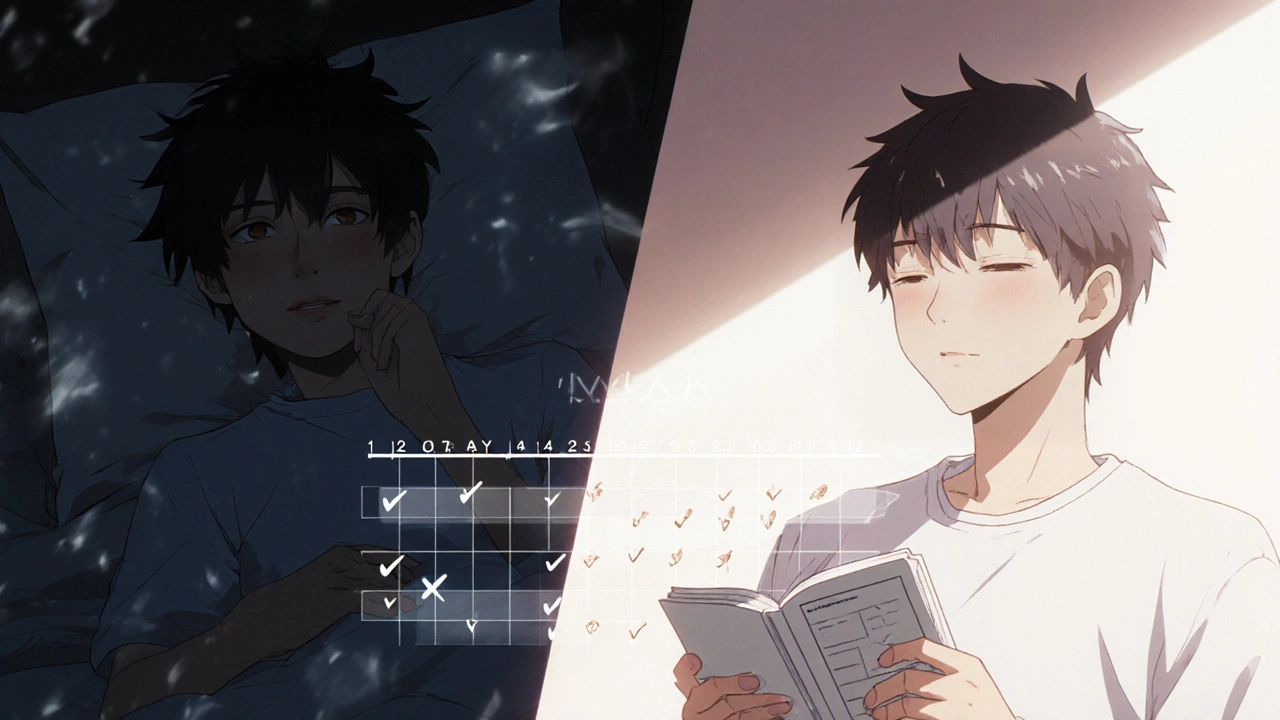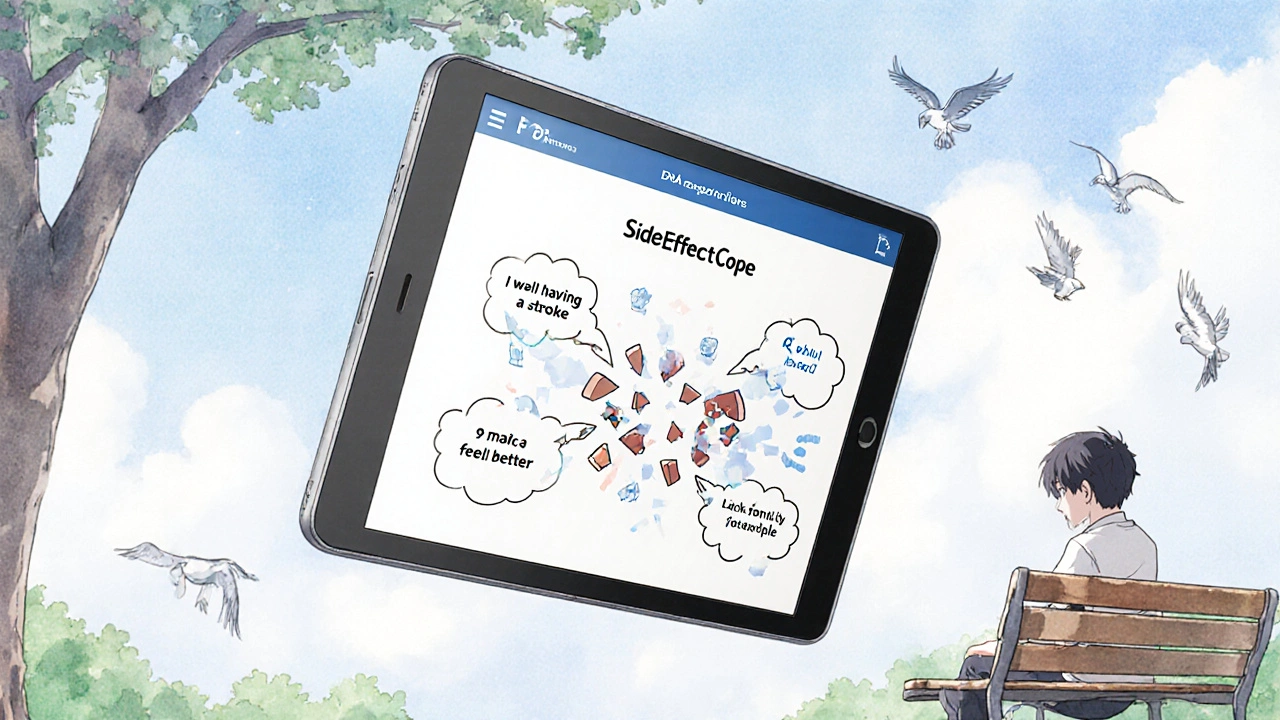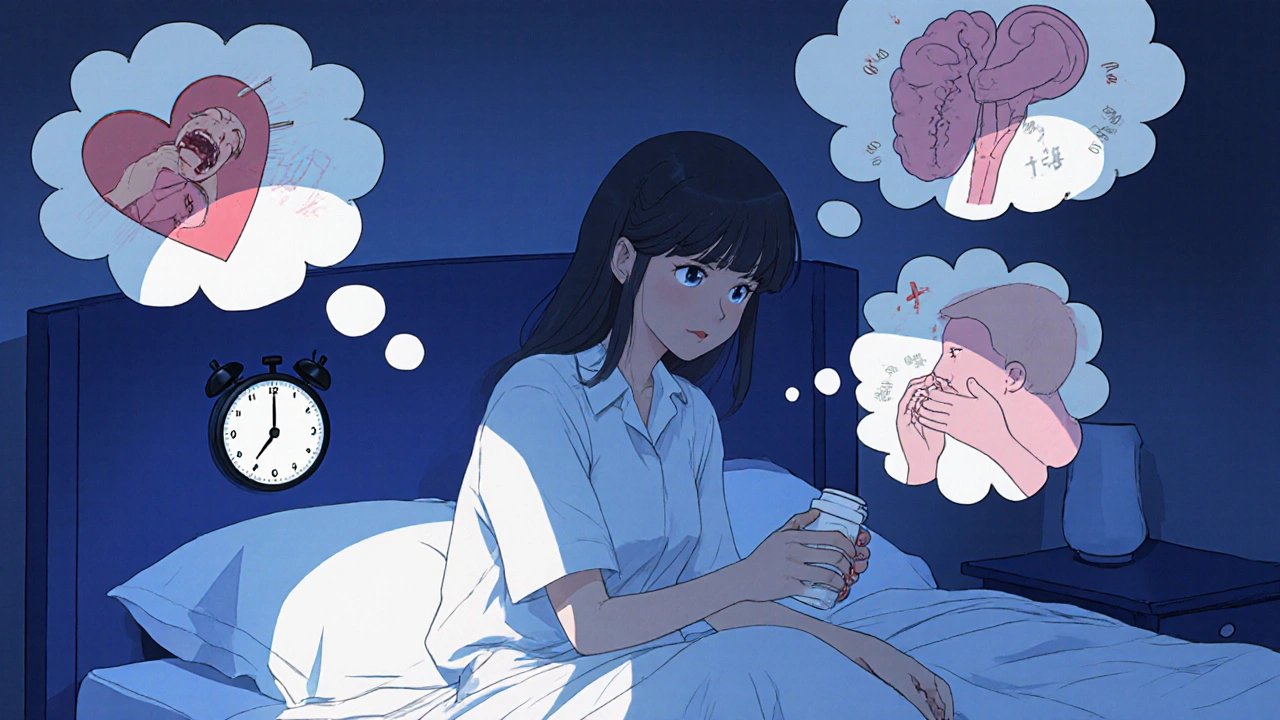Medication Side Effects Timeline Calculator
Understand Your Side Effects Timeline
Most side effects aren't dangerous—they're temporary. This tool shows you how long side effects typically last based on research from Mayo Clinic and other studies. Knowledge is your best defense against anxiety.
Side Effects Timeline
Initial symptoms may appear. This is normal as your body adjusts.
Symptoms often peak. This is the most challenging period.
Symptoms begin to fade significantly for most people.
Most side effects resolve completely. 70-80% of people report no significant side effects after 2-4 weeks.
Key Insights for Your Situation
Feeling panicked because your new medication gives you a headache or makes you feel nauseous? You’re not alone. In fact, medication side effects anxiety is one of the most common reasons people stop taking prescriptions-even when those meds are working. Many assume the worst: “This dizziness means my heart is failing,” or “This nausea will never go away.” But the truth? Most side effects aren’t dangerous. They’re temporary. And the biggest barrier to sticking with your treatment isn’t the drug-it’s your mind.
Why Your Brain Makes Side Effects Worse
Your brain is wired to protect you. When you hear “side effects,” it jumps to danger. That’s normal. But when you’re already anxious about your health, that alarm system goes into overdrive. This isn’t just “being dramatic.” It’s science. Researchers call it the nocebo effect-when expecting a bad outcome actually causes it. A 2020 study found that 60% of people on blood pressure meds reported side effects like fatigue, dizziness, or sleep problems. But in placebo groups (people taking sugar pills), nearly the same number reported the exact same symptoms. The drug wasn’t the problem. The fear was.What Actually Happens When You Start a New Medication
Most side effects don’t stick around. Take SSRIs, for example-the most common antidepressants. Nausea? It usually peaks on day 3 or 4. Dizziness? Fades by day 7. Fatigue? Lifts within 10-14 days. A 2023 Mayo Clinic review showed that 70-80% of these side effects disappear within 2-4 weeks of consistent use. Yet, many people quit after just 3-5 days because they think it’s never going to get better. That’s why knowing the timeline matters. If you’re told, “This nausea will drop by day 14,” you’re 32% more likely to stick with the treatment, according to a 2021 study in the Journal of Clinical Psychopharmacology.Cognitive Behavioral Therapy (CBT): The Gold Standard
CBT isn’t just for depression. It’s the most effective tool for managing medication anxiety. A 2022 meta-analysis found that people who got CBT alongside their meds were 58% less likely to quit treatment compared to those who only took pills. How does it work? It breaks down the spiral of fear.- Catastrophic thinking: “This headache means I’m having a stroke.”
- Reality check: “Have I ever had a stroke before? Does this headache feel like one? What do doctors say about this symptom?”
- Probability testing: “If 9 out of 10 people on this drug feel better after 2 weeks, what’s the real chance I’m the one who won’t?”
Other Proven Psychological Tools
CBT isn’t the only option. Different tools work for different people.- Acceptance and Commitment Therapy (ACT): Instead of fighting the anxiety, you learn to sit with it. “I feel nauseous. That’s uncomfortable. But I’m still going to take my pill because this matters to me.” Studies show ACT matches CBT in effectiveness and works better over time-72% of users still felt in control after 6 months.
- Mindfulness-Based Stress Reduction (MBSR): Just 8 weeks of daily 10-minute breathing exercises can cut medication anxiety by 50-60%. It’s simpler than CBT and doesn’t require a therapist. Apps like Insight Timer or Smiling Mind (free in Australia) offer guided sessions.
- Symptom normalization: Keep a simple journal. Write down: “Day 5: Headache, mild. Took pill with food. Slept 7 hours.” Over time, you’ll see patterns. You’ll notice the side effect wasn’t worse after missing a dose. Or that it faded on weekends. This turns fear into data.

Practical Tips That Actually Work
You don’t need a PhD to manage this. Here’s what real people do:- The two-week rule: Commit to taking your med for 14 days-even if you feel awful. After that, reassess with your doctor. Most people who follow this stop quitting after the first bad week.
- Timing matters: If your med causes insomnia, take it in the morning. If it causes nausea, take it with food. These aren’t guesses. Cleveland Clinic data shows morning SSRIs reduce insomnia from 35% to 15% in 80% of patients.
- Use distraction: When anxiety spikes, do something that demands focus-wash dishes, walk the dog, solve a puzzle. Your brain can’t panic and problem-solve at the same time.
- Find your tribe: Reddit’s r/mentalhealth has over 3,000 posts from people who’ve been there. One user wrote: “I stopped checking Drugs.com after day 3. Started journaling instead. My anxiety dropped 70%.”
What to Do When Your Doctor Dismisses You
A 2024 review of 1,243 patient comments found that 42% of people quit meds because their doctor said, “It’s all in your head.” That’s not helpful. It’s harmful. If your doctor won’t talk about anxiety, bring data. Say: “I read that CBT improves adherence by 40%. Can we talk about resources?” Or ask for a referral to a psychologist who specializes in chronic illness or medication adherence.What’s Changing Right Now
The field is moving fast. In March 2024, the FDA approved the first digital app-SideEffectCope-built specifically to help people manage medication anxiety using CBT techniques. In phase 3 trials, users were 53% less likely to quit their meds. Health systems like Kaiser Permanente have rolled out standardized anxiety protocols across 39 centers. And by 2026, 78% of major clinics plan to offer these tools through telehealth.
Who Benefits Most?
Women between 25 and 54 are the biggest users of these strategies-62% of those seeking help. But it’s not about gender. It’s about how deeply you care. People who care most about their health often worry most about side effects. That’s not weakness. It’s responsibility. The goal isn’t to stop worrying. It’s to stop letting worry stop you from getting better.Where to Start Today
1. Write down your top 3 fears about your medication. Be specific. “I’m scared I’ll gain weight.” “I think this will make me suicidal.” 2. Look up the timeline for each fear. Mayo Clinic, HelpGuide.org, and the Better Health Channel all have clear charts. Print them. 3. Set a 14-day trial. No quitting. Just tracking. 4. Try one tool. Pick one: journaling, breathing, or the two-week rule. Do it daily. 5. Call your doctor after 14 days. Bring your notes. Say: “I tried these strategies. Here’s what happened.”It’s Not About Tolerating the Bad. It’s About Trusting the Process.
Medications aren’t magic. They’re tools. And tools take time to work. Your anxiety isn’t a flaw-it’s a signal that you’re trying to protect yourself. But you don’t need to protect yourself from the medicine. You need to protect yourself from the fear. The best way to do that? Learn the facts. Track your experience. Give your body time. And remember: you’ve already survived 100% of your worst days so far. You can do this one more.Can anxiety make side effects worse?
Yes. Anxiety can amplify physical symptoms through the nocebo effect-where expecting harm leads to experiencing it. Studies show people who fear side effects report them more often and more intensely-even when taking placebos. Managing anxiety doesn’t mean ignoring real symptoms, but it does mean stopping the cycle where fear turns normal reactions into crises.
How long do medication side effects usually last?
Most common side effects like nausea, dizziness, fatigue, or dry mouth peak within 3-7 days and fade significantly by day 14-21. For antidepressants, 70-80% of side effects resolve within 2-4 weeks. Rarely do they last longer than 6 weeks unless the medication isn’t right for you. Always check timelines from trusted sources like Mayo Clinic or the Better Health Channel before assuming it’s permanent.
Is CBT better than just taking the medication?
CBT doesn’t replace medication-it supports it. People who use CBT alongside their meds are 58% less likely to stop treatment. Medication treats the condition. CBT treats the fear of the medication. Together, they work better than either alone. Think of CBT as training your brain to not sabotage your own recovery.
What if I still feel awful after two weeks?
Two weeks is a benchmark-not a deadline. If side effects are severe (chest pain, rapid heartbeat, confusion, suicidal thoughts), contact your doctor immediately. But if you’re just feeling tired, nauseous, or emotionally raw, that’s often part of the adjustment. Track your symptoms. Are they getting slightly better each day? If yes, keep going. If they’re worsening or unchanged after 4 weeks, talk to your doctor about adjusting the dose or switching meds.
Can I manage this without a therapist?
Yes. Many people successfully use self-guided tools: workbooks like Dr. Martin Antony’s, free mindfulness apps, journaling, and peer support groups. The key is consistency. Do one technique daily for 8 weeks. You don’t need a therapist to start-but if you’re stuck after 4 weeks, or your anxiety feels overwhelming, a professional can help you go deeper.
Are there apps that help with medication anxiety?
Yes. In March 2024, the FDA approved the first app called SideEffectCope, designed specifically for this issue. It uses CBT techniques to help users reframe fears and track symptoms. Other apps like Smiling Mind, Headspace, and Moodfit also offer tools for anxiety and stress management that can support medication adherence. Check if your health provider offers free access to any digital mental health tools.
Next Steps: What to Do If You’re Still Struggling
If you’ve tried the tools and still feel stuck, don’t blame yourself. This is hard. Here’s what to try next:- Ask your doctor for a referral to a clinical psychologist who specializes in chronic illness or health anxiety.
- Join a support group-online or in person. Seeing others who’ve been there reduces isolation.
- Request a medication review. Sometimes the issue isn’t anxiety-it’s the wrong drug or dose.
- Try combining techniques. Journaling + breathing + the two-week rule often works better than any single method.


Scott Dill
October 31, 2025 AT 01:59Bro, I took SSRIs for 3 weeks and thought I was dying. Headache, nausea, felt like my brain was melting. Then I read the Mayo Clinic timeline and realized I was just panic-scrolling Drugs.com. Took the pill with food, slept it off, and boom-day 14, I felt like myself again. Seriously, just give it two weeks. Your brain lies to you.
Aditya Singh
November 1, 2025 AT 06:56While the nocebo effect is statistically significant, conflating psychosomatic amplification with physiological reality is a dangerous oversimplification. The neurobiological pathways of interoceptive hypersensitivity in GAD populations demonstrate a distinct HPA-axis dysregulation that cannot be reduced to cognitive distortion alone. One must account for epigenetic modifiers and pharmacokinetic variability-especially in CYP2D6 poor metabolizers-which the article conspicuously ignores.
Katherine Reinarz
November 2, 2025 AT 14:54OMG I SOOOO get this!! I was on Zoloft and thought I was gonna die from the nausea like wtf is happening?? I cried in the shower for 20 mins. Then I started journaling and it was like… wait, I’m not dying?? I’m just grossed out?? I’m so glad I didn’t quit. Also I love you author you’re a genius 💖
Callum Breden
November 3, 2025 AT 08:41It is regrettable that this article reduces complex neuropharmacological phenomena to a series of self-help platitudes. The notion that ‘just journaling’ can override a physiological response to pharmacological agents is not only reductive, but ethically dubious. One cannot dismiss the legitimacy of adverse reactions by invoking cognitive behavioral techniques. This is medical negligence disguised as empowerment.
Mansi Gupta
November 4, 2025 AT 18:44I appreciate the effort to demystify medication anxiety. Many people, especially in cultures where mental health is stigmatized, feel ashamed to admit they’re scared of side effects. The two-week rule is practical. I’ve seen friends quit meds too soon because they didn’t know what to expect. Just having clear timelines helps more than we realize.
Holly Dorger
November 5, 2025 AT 16:23I tried the journaling thing and honestly it changed everything. I wrote down ‘day 3: headache, took pill with toast, slept 6 hours’ and then day 7: ‘headache less, slept 7, no dizziness’. Seeing it on paper made me realize it was getting better. I didn’t even know I was tracking progress until I looked back.
Amanda Nicolson
November 5, 2025 AT 19:19When I started my new antidepressant, I was convinced I was having a stroke every time I felt dizzy. I called my doctor three times. I Googled ‘dizziness + death’ at 2 a.m. I thought I was broken. Then I read this article. I did the breathing exercises. I waited. And guess what? On day 11, I woke up and realized I hadn’t thought about the side effect all day. That was the first time I felt like I was healing, not just surviving.
Jackson Olsen
November 6, 2025 AT 06:59Been there. Took the pill. Felt weird. Thought I was dying. Then I watched a 5-min video on how SSRIs work. Didn’t even need a therapist. Just knew it wasn’t magic-it was chemistry. Gave it 14 days. Now I’m fine. And I’m not even that ‘mental health aware’ person. Just followed the steps.
Penny Clark
November 7, 2025 AT 09:15i started using smiling mind every morning before my pill and it was like my brain finally stopped screaming. i didn’t even realize how much i was panicking until i sat quiet for 10 mins. also i cried during one session and felt better after. weird but true. also the app is free so if u r on a budget try it!! 🌿
Niki Tiki
November 9, 2025 AT 00:46Y’all are acting like this is some deep secret. I’m from Texas and we don’t have fancy apps or therapists. We just take the damn pill, drink water, and don’t Google symptoms. If you’re gonna quit meds because you feel weird, maybe you shouldn’t be on them in the first place. Stop overthinking. Just live.
Jim Allen
November 10, 2025 AT 17:53So… the real issue here isn’t the medication-it’s capitalism? We’re being sold ‘self-help’ as a substitute for proper healthcare? I mean, sure, journaling helps-but why isn’t the system giving people access to actual psychologists instead of pushing them to download apps? This feels like a Band-Aid on a broken leg.
John Kane
November 11, 2025 AT 01:51I want to say thank you to everyone who’s shared their stories here. This isn’t just about medication-it’s about how we treat people who are scared. We’ve all been there: lying awake, heart racing, convinced something’s wrong. What this post gives us isn’t just facts-it’s permission to feel scared and still keep going. I’ve worked with patients who quit meds because they felt judged. You’re not weak for being afraid. You’re human. And the fact that you’re reading this? That’s courage. Keep showing up. Even on the days you just want to throw the pills out the window. You’re doing better than you think.
Carolyn Kiger
November 12, 2025 AT 02:14Just wanted to add that combining ACT with journaling worked better for me than CBT alone. I stopped fighting the nausea and just said, ‘Okay, you’re here. I’m still taking my pill.’ It sounds silly, but letting the feeling exist without fighting it made it lose its power. I didn’t need to fix it-I just needed to sit with it. And that’s okay.
Nate Girard
November 12, 2025 AT 17:54My doctor told me my anxiety was ‘normal’ and sent me a PDF. I felt dismissed. Then I found a Reddit thread where someone said, ‘Try the two-week rule.’ I did. I wrote down every symptom. I didn’t quit. And on day 15, I realized I hadn’t thought about the side effect all day. That’s when I knew I was healing. Thank you for writing this. I needed to hear someone say it’s okay to feel this way-and still keep going.